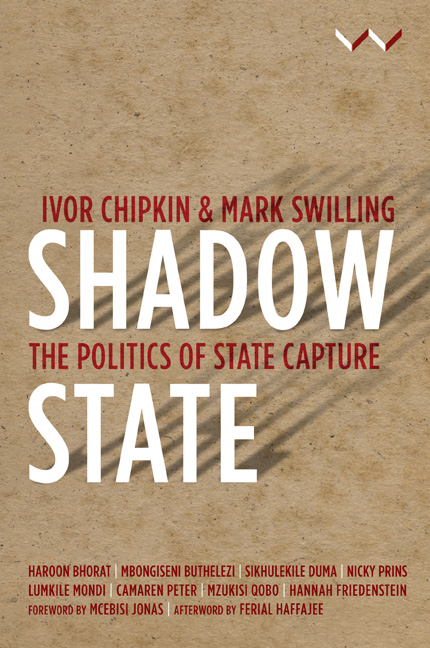Book contents
- Frontmatter
- Contents
- List of figures and tables
- Acronyms and abbreviations
- Key terms
- Acknowledgements
- Foreword
- Prologue
- Introduction
- Chapter 1 Structuring the Capture of the State
- Chapter 2 The Politics of Betrayal
- Chapter 3 Power, Authority and Audacity: How the Shadow State Was Built
- Chapter 4 Repurposing Governance
- Chapter 5 Conclusion
- Afterword
- Contributors
- Index
Foreword
Published online by Cambridge University Press: 17 May 2019
- Frontmatter
- Contents
- List of figures and tables
- Acronyms and abbreviations
- Key terms
- Acknowledgements
- Foreword
- Prologue
- Introduction
- Chapter 1 Structuring the Capture of the State
- Chapter 2 The Politics of Betrayal
- Chapter 3 Power, Authority and Audacity: How the Shadow State Was Built
- Chapter 4 Repurposing Governance
- Chapter 5 Conclusion
- Afterword
- Contributors
- Index
Summary
In March 2017, a few weeks before Pravin Gordhan and I were removed from the Ministry of Finance by former President Jacob Zuma, I met with Professor Mark Swilling at the Sustainability Institute in Stellenbosch. Mark and I had known each other and worked together for many years and he is someone I had come to rely on in the academic community. I had asked Mark to meet with me to discuss my increasing concern about the polarised, and frankly deliberately rudimentary, debate that was emerging on state capture. As the pressure was mounting on the perpetrators of state capture, so they were ratcheting up the narrative that this was a political project to displace white monopoly capital – a project of radical economic transformation to free black economic empowerment from the insidious forces of what was increasingly referred to as white monopoly capital. I was also concerned that as South Africans scrambled to grasp the meaning of state capture, there was a propensity to simplify it to ‘corruption’.
It was clear that if we as a nation failed to understand the significance of what we were facing, we would also have to accept that our hard-won democracy would become something that we talked about as lost in our lifetime. That was the danger that we faced.
My concern, like that of many South Africans, was multi-layered – I was distressed at a personal and professional level, and in my case, also as a member of the ruling African National Congress (ANC). When the ANC came to power in 1994, we promised that we would ensure that progressively we would destroy the apartheid-era bureaucracy, and that we would build a capable state to drive forward the agenda of liberating our people and deepening development in our country. It was becoming apparent to me that the significant progress we had made since 1994 in transforming our state institutions into vehicles for service delivery and development, and building the constitutional foundations of our democracy, was under severe threat from the gluttonous tentacles of a small but powerful business and political elite.
By the time Mark and I met, there was already significant pushback against state capture from various sites of accountability, including but not limited to investigative journalists and the media in general, civil society and the judiciary.
- Type
- Chapter
- Information
- Shadow StateThe Politics of State Capture, pp. xvii - xxPublisher: Wits University PressPrint publication year: 2018



